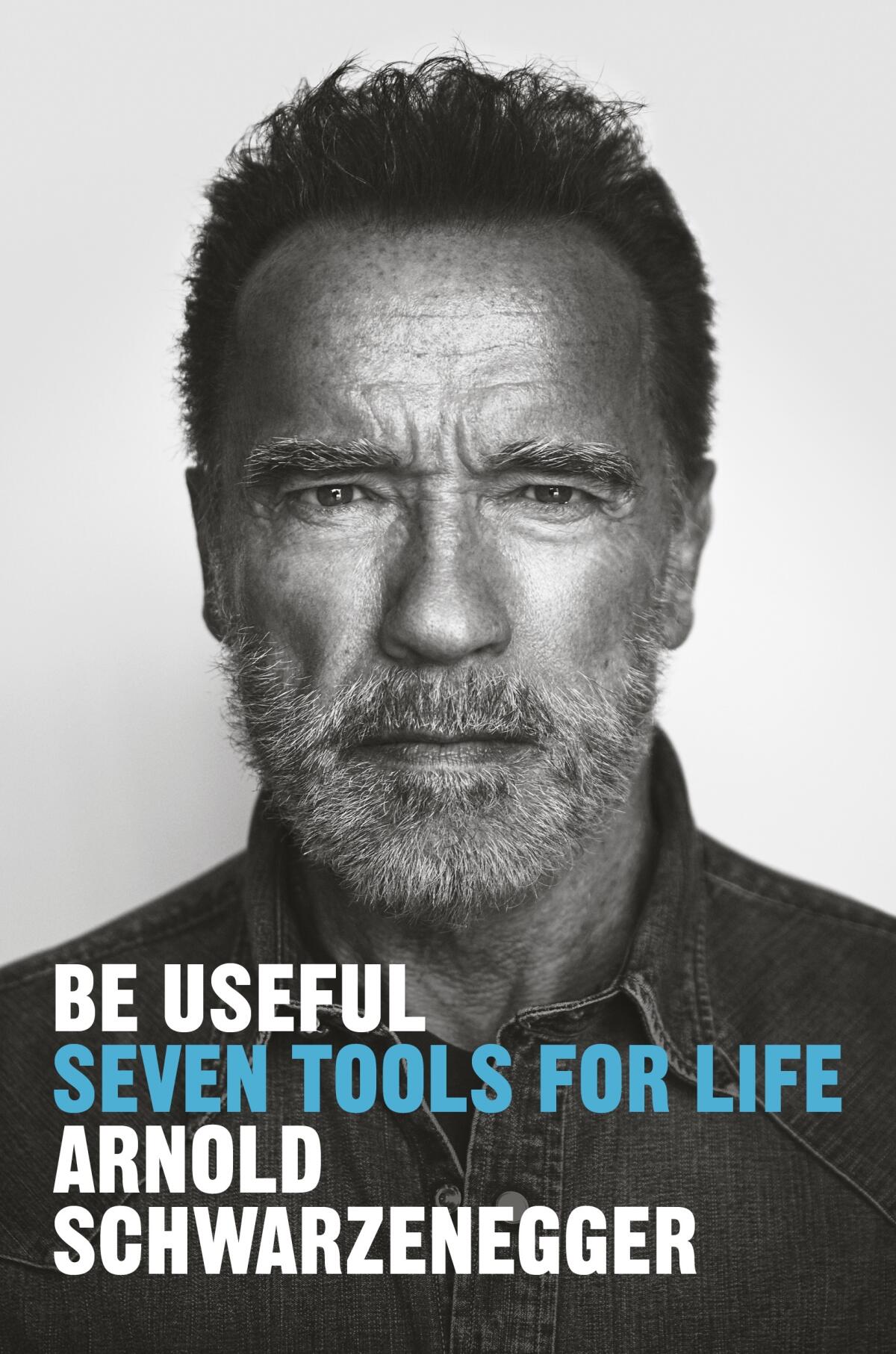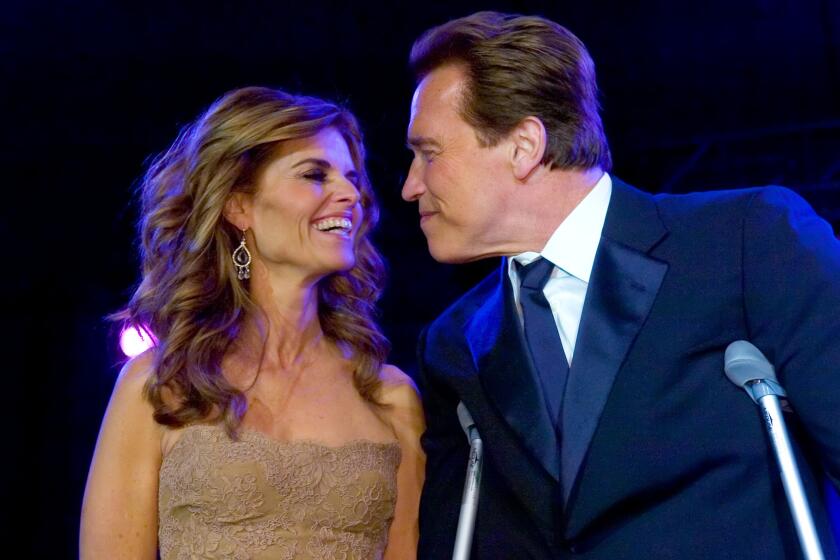Sensei Schwarzenegger? The Governator attempts a reboot with a pallid self-help book

Review
Be Useful: Seven Tools for Life
By Arnold Schwarzenegger
Penguin: 288 pages, $28
If you buy books linked on our site, The Times may earn a commission from Bookshop.org, whose fees support independent bookstores.
Bodybuilder, movie star, politician: Arnold Schwarzenegger has played many roles. Now 76, the five-time Terminator becomes a first-time Tony Robbins with the publication of his self-help book, “Be Useful: Seven Tools for Life.”
This “fourth act,” he says, is a byproduct of the “failure and redemption and reinvention” that followed the end of his California governorship and the breakdown of his marriage to Maria Shriver. Yes, like a moribund franchise, the Austrian Oak has been rebooted — this time as an elder statesman ready to dispense hard-won wisdom as abundantly as he once doled out movie death. (For the record: “By the end of 1987,” he writes proudly, “I’d killed 283 people.”)
You’re probably already somewhat familiar with fourth-act Schwarzenegger, the cuddly sensei. On pandemic-era TikTok, you’d find him puttering around with his miniature horse and donkey, Whiskey and Lulu; on YouTube, you could catch snippets of him sternly comparing Jan. 6 to Kristallnacht. More recently, you might have slogged through the three-hour Netflix documentary “Arnold” or signed up for emails from Arnold’s Pump Club. Arnie is in full legacy mode and, to paraphrase a line from “The Terminator,” he absolutely will not stop — ever — until you are sold.
Arnold Schwarzenegger discusses affair in interview
He’s sure got some selling to do. With his history of casual chauvinism and cheesy put-downs, it’s easy now to reflect on the Governator’s rise as another skid on the slippery slope to Donald J. Trump. Even at the time, his political advent was heralded by some as an end-of-days moment — like a jacked-up junk-food Reagan, he seemed to represent the final triumph of celebrity over substance.

But Arnie IV is different from the earlier models. The locker-room misogyny has been retired — on Netflix, he’s vocally contrite about any offense he may have caused. His rambunctious political style, though it had always been a cloak for more pragmatic positions — he’s more of a Nixon or Rockefeller Republican, an Establishment moderate, than a Trump-like figure — has given way to a more subdued interview manner. His sensible guru era suggests that Schwarzenegger believes it’s temperance rather than bile that behooves an elder statesman and that the nation will eventually return to its senses. It also puts clear space between him and the parlous ghouls of today’s GOP, with its commando tactics and true lies.
But what of the book? Permit me to save you the trouble of finding out for yourself: “Be Useful” is a raw deal, a hollow PR exercise filled with precepts and quips but devoid of self-awareness or humility. You might be swayed by Arnie’s touching faith in bipartisanship and the need to tackle the climate crisis or moved by his tales of heroic procurement of personal protective equipment during the early days of the COVID-19 pandemic. But as a pitch for Marcus Aurelius status (the erstwhile emperor is thanked in the acknowledgments), it’s thoroughly expendable — an overpromoted TED Talk, just another cross-promotional weapon in the Schwarzenegger multimedia arsenal.
“Be Useful” reads more like a Chat GPT digest of “Total Recall,” Arnie’s turgid 2012 memoir, than spiritual guidance. And based on the clichés it spits out, this particular chatbot heralds no “Terminator”-style rise of the machines.
“This life isn’t a dress rehearsal,” we read. “Only you can create the life you want for yourself.” Furthermore, “The only limits that truly exist are in our minds.” Ignore the naysayers: Your calves can be as big as your 24-inch biceps. You find yourself wishing Skynet would come online just to put an end to all this insipid positivity.
Christopher Soto and USC poet and professor Jackie Wang have spent months talking about how AI will change writers’ livelihoods — and their art.
Sensei Schwarzenegger isn’t just trying to pump up your muscles — he’s also looking for the gains in your self-esteem. But even the live-laugh-love stuff is weirdly incoherent. On one page, we’re encouraged to look in the mirror and attempt to “really see” ourselves (all the better to achieve our visions of glory); on another, in the spirit of selflessness, to “Break your mirrors!” This is perhaps unsurprising: It’s clear from the earlier memoir that Arnie has only enough self-reflection to put aside tricky subjects — irony, personal tragedy, the agony of metaphor — “so I could go on with my goals.”
Arnie may be softer than he used to be, but the muddle of “Be Useful” and the “Arnold” doc sets his lifelong campaign for the respect of others back a few yards. “To sell things,” the author told Netflix, “you have to have the Schmäh.” (Helpfully, he translates: It’s German for BS.) Unfortunately for the guru, only a schmo would fall for this Schmäh.
Take, for example, this improbable assertion: “I don’t shy away from responsibility,” he writes. “I own who I am and the things I do — my successes and my failures. ... Why lie? What is the point of that?” Though he may be referring to setbacks in his gubernatorial career, such a position does not transfer easily across to Schwarzenegger’s personal conduct down the years, which has scarcely been an object lesson in integrity. He embraced neither truth nor his own responsibilities when he hid from Shriver for many years the fact that he’d fathered a child with a member of their household staff.
One might also remember that days before the 2003 recall election that made Schwarzenegger governor of California, the Los Angeles Times reported allegations made by six women that the candidate had groped and humiliated them in incidents dating back to 1975. “What could you do?” one of the women interviewed said. “He was the highest-paid actor in the world. I was a peon.” (In a review of the Netflix doc, Rolling Stone reports that the number of complainants later grew to 15.) A spokesman for the candidate said in 2003 that Schwarzenegger did not engage in improper conduct toward women, and though Arnie backtracked soon thereafter, it still took 20 years for a proper apology to come — and even then only to Netflix subscribers.
Arnold Schwarzenegger’s new ‘FUBAR’ character reminds the star of his own infidelity and divorce. But with Maria Shriver, he says, ‘It was my failure.’
Is there anything actually useful in “Be Useful”? If you believe that a dogmatic attachment to pain is necessary to achieving your goals, you may find some motivation in the realtalk. “Working your ass off is the only thing that works 100 percent of the time for 100 percent of the things worth achieving,” he writes. Fine. “Rest is for babies and relaxation is for retired people.” Sure thing. Did I work out a little harder after reading the book? You bet.
And although the writing doesn’t pump much iron (just picture those “massively beautiful Himalayas,” if you can), there are some amusing moments. “Plan B is to succeed at plan A” is a quip worth repeating. The old self-deprecating charm still works too; we smile now just as we chuckled before, when the Arnie of old said, “Trust me” or “I’ll be back.”
That the book is a naked attempt by a twilight superstar to shore up his legacy and project a new and benign vision of himself is abundantly obvious. Be not fooled: When Schwarzenegger talks of having vision, the “tunnel” is silent.
Arrowsmith is based in New York and writes about books, films and music.
More to Read
Sign up for our Book Club newsletter
Get the latest news, events and more from the Los Angeles Times Book Club, and help us get L.A. reading and talking.
You may occasionally receive promotional content from the Los Angeles Times.










